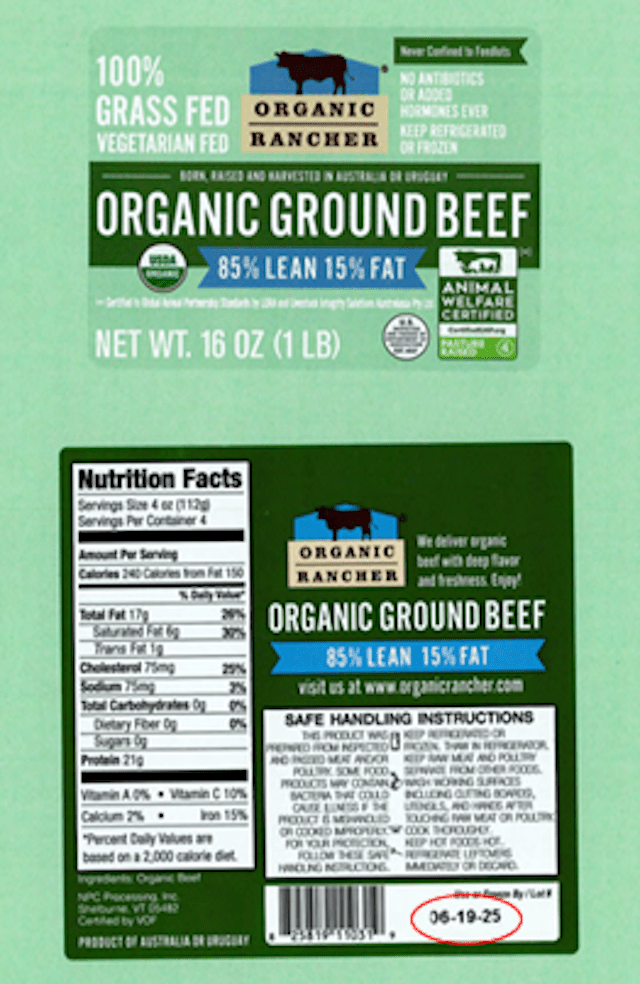Ground Beef Sold at Whole Foods May Be Contaminated With E. Coli, USDA Warns coli, the USDA warns. Here’s what to know

Ground beef from Organic Rancher sold at Whole Foods may contain E

Yevgen Romanenko / Getty Images / Health
- Ground beef sold at Whole Foods nationwide is under a public health alert.
- The raw ground beef from Organic Rancher tested positive for E. coli.
- The beef is no longer for sale, but may still be in your fridge or freezer—return or toss it.
Ground beef sold at Whole Foods stores nationwide may be contaminated with E. coli, bacteria that can cause serious foodborne illness.
The beef is no longer on store shelves, but consumers are still being urged to check their kitchen for the ground beef and throw it away.
How to Tell if Your Ground Beef Is Affected
On Tuesday, the USDA's Food Safety and Inspection Service (FSIS) issued a public health alert for raw ground beef from Organic Rancher, which can be identified by the following information:
- Product Name: ORGANIC RANCHER ORGANIC GROUND BEEF 85% LEAN 15% FAT
- Package Size: 1-pound packages
- Use-or-Freeze-By Dates: 06-19-25 and 06-20-25
- Establishment Number: EST. 4027 (printed inside the USDA mark of inspection)

Organic Rancher
Where Was It Sold?
The affected beef was sent to distributors in Connecticut, Georgia, Illinois, and Maryland, then shipped to Whole Foods locations across the country.
Why E. coli Is a Concern
FSIS issued the public health alert after being notified that the ground beef tested positive for E. coli.
If consumed, the bacteria can cause serious illness, with common symptoms of diarrhea and stomach cramps. To date, there have been no reports of illness connected to the beef.
Most people recover from E. coli infection within a few days without medical treatment. However, certain groups—children under age 5, adults 65 and older, and those with weakened immune systems—are more likely to experience a severe illness.
Symptoms of severe E. coli infection include:
- Diarrhea and a fever above 102°F
- Diarrhea for more than three days that is not improving, or bloody diarrhea
- Extreme vomiting that makes it hard to keep liquids down
- Signs of dehydration, such as not peeing, having a dry mouth or throat, or feeling dizzy
- Signs of hemolytic uremic syndrome, including decreased alertness, loss of color in the cheeks, unexplained bruising or tiny red spots on the skin, irritability, or blood in pee
What You Should Do Now
Check your fridge and freezer for the affected ground beef. If you have it, do not cook or eat it.
Return the meat or throw it away, wash and sanitize any surfaces it touched, and monitor for signs of E. coli infection.
Seek medical attention right away if you or a loved one experiences symptoms of a severe E. coli infection.
 Amber Brenza
Amber is the Associate Editorial Director overseeing news content for Health, ensuring that readers stay up-to-date on trending topics like COVID-19, as well as the most recent research in the health and wellness space.
learn more
Read more:
Amber Brenza
Amber is the Associate Editorial Director overseeing news content for Health, ensuring that readers stay up-to-date on trending topics like COVID-19, as well as the most recent research in the health and wellness space.
learn more
Read more:
This story originally appeared on: Health News - Author:Jenna Anderson
















